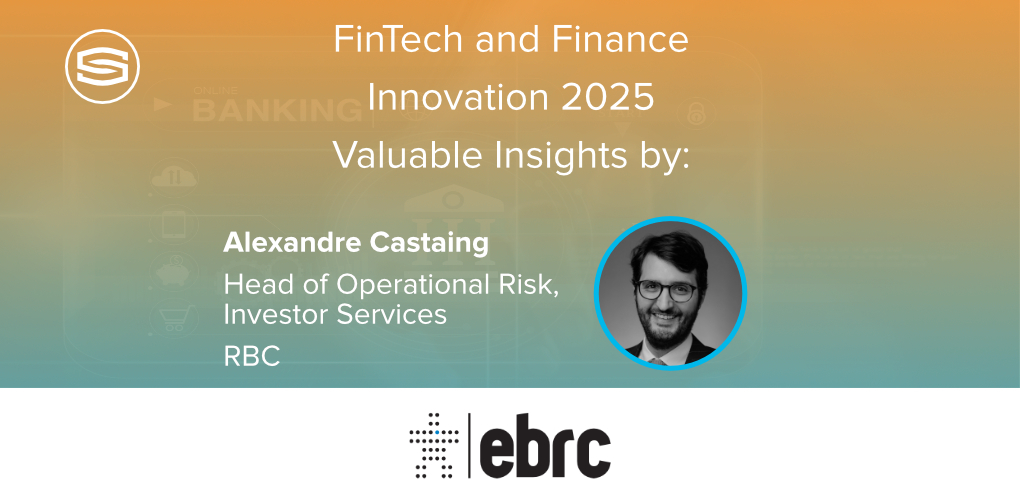
Insights & Opinions
FinTech and Finance Innovation 2025: Insights by Alexandre Castaing, RBC
Wed, 20 Oct 2021


We never lived in a more connected world as we do today. Software gets cheaper every day, and cloud technology lowered the barriers of implementing new solutions and maintaining them. Needless to say that this new reality of endless opportunities comes with new risks.
That triggered us to talk to Alexandre Castaing in the context of our report "Finance and FinTech Innovation 2025 – Hybridization Designs the Future of the Finance Industry". Alexandre is Head of Operational Risk, and Investor Services today, and back then Head of Cyber, Tech, Fraud and Third-Party Risk - EU and APAC at Royal Bank of Canada.
BigTech eating the world?
The pandemic changed our world. Digital services became a vital requirement for any organization to survive.
Over the last 1,5 years of the COVID19 pandemic, banks urgently required support to improve their digital capabilities while maintaining a good risk profile. As a consequence, they looked for trusted brands and companies that have a proven track record.
Alexandre expects this to lead to an even more saturated market of software houses where smaller players may face challenging times unless they have a unique technology or services offering. The almost daily pieces of news highlighting global BigTech companies that support banks and develop new services prove his point. Their new product developments could be seen as a threat for the finance industry as BigTech doesn’t always fall under a strong regulatory regime.
Amazon has its own digital coin, and Facebook is very vocal on their project Diem (formerly known at Libra).
Alexandre: "Banks are regulated. We always need to strike a balance between innovation and regulatory requirements. For BigTech, it tends to be more fluid. Although the regulators try to control the innovation, it is running faster in the BigTechs who use mass adoption to weigh in negotiations."
New regulations like MiCA (Markets in Crypto-Assets) and DORA (Digital Operational Resilience Act) are good steps forward. It will provide a standard framework enabling the financial industry to build a trusted ecosystem and create a level playing field for all players, including BigTech companies.
A framework for collaboration
PSD2 set a standard for banks to open up their current accounts and payments. According to Alexandre, that was an excellent start to foster collaboration and partnership, but MiCA and DORA will help even more in his opinion.
Many FinTech companies have bright ideas and top-notch solutions, but they are insufficiently regulated to ensure good customer protection. DORA will provide a framework for each player working in information technology to bring clarity in complexity.
"The one challenge banks still have is how to manage their sub parties and due diligence," explained Alexandre. "That's a hassle. The regulator is very stringent in terms of outsourcing. You have to do a lot of due diligence, and many players underestimate that."
Regtech companies can help banks take a head start. Many have technology available to assist banks in their operational resilience and management of third-party relationships.
The future is distributed
The most promising space in FinTech, according to Alexandre, is everything related to crypto and DLT (distributed ledger technology).
"One reason I believe the future is distributed is that many of the solutions we use from FinTech companies relate to trust: it is about reporting, is about connectivity", he explained.
"If you have a DLT solution, you don't need all that adds complexity to your infrastructure. You simply remove the complexity, and then you plug into the DLT, which brings full transparency and trust. "
With EGS on top of every board's agenda today, transparency is no longer a nice-to-have but a must-have. The lower the cost to provide clarity, the better. DLT and blockchain have unique characteristics to reduce that cost further.
In the crypto space, Alexandre sees much potential for FinTech companies that invest in solutions like custody services, wallet solutions, advisory services etc., whether that is white-labelled to assist banks or by targeting the end-customer themselves.
Also, banks have a competitive advantage in the crypto space compared to smaller FinTech organizations if they take the opportunity.
"Think about FinTech: when they provide a bank's regulatory reporting, and there is an outage, it does not impact a huge number of clients", he explained. "Now think about blockchain and smart contracts. Let's say you have 10 billion records. What do you do if it breaks? If a cyber-attack or a software bug is causing a long outage?
It's going to have a massive impact on the financial market. In the context of resilience, having a big player who knows how the process works can help translate the requirements into the new world safely. This is a critical factor for the success of crypto in finance."
Conclusion
Looking at the future, Alexandre believes that banks continue to face challenging times. BigTech and neobanks will shake up the status. However, banks that grasp the right opportunities, the ones that can reinvent themselves, have a bright future.
Through collaboration, the intelligent use of technology like AI, automation and DLT, they can streamline their organization and refocus on business growth and ecosystem building to make banking important in every step of a customer's life.
If you like to know more, we recommend you read the white paper "Finance and FinTech Innovation 2025 – Hybridization Designs the Future of the Finance Industry", including insights of Alexandre Castaing and many more key stakeholders in the finance industry.
More articles of different contributors to this study can be found here.
At The Banking Scene Conference 2022 Luxembourg on February 22, you get the chance to join the conversation. Together, we investigate how banks should pivot their role in society to continue being trusted partners for their stakeholders in the future.